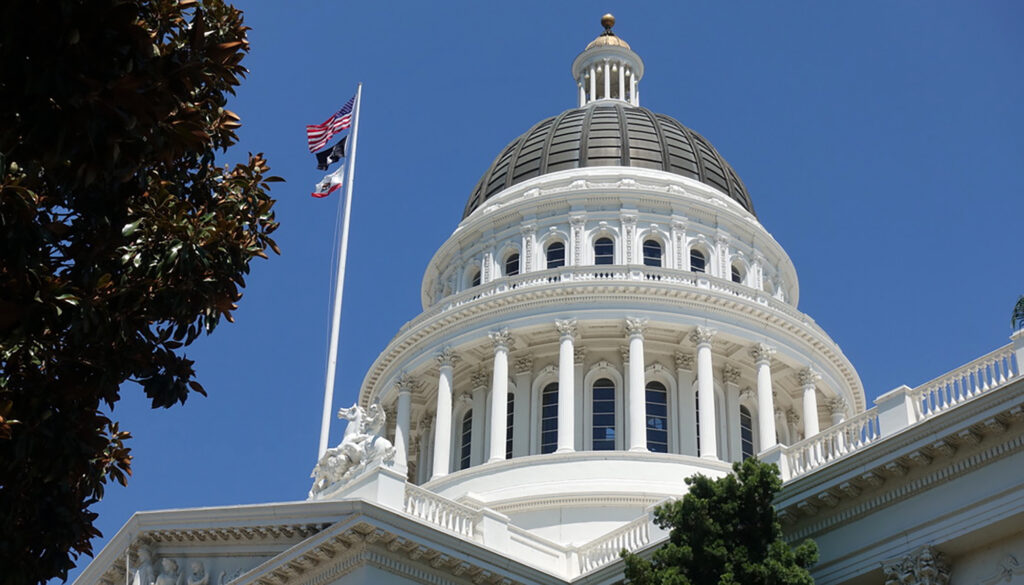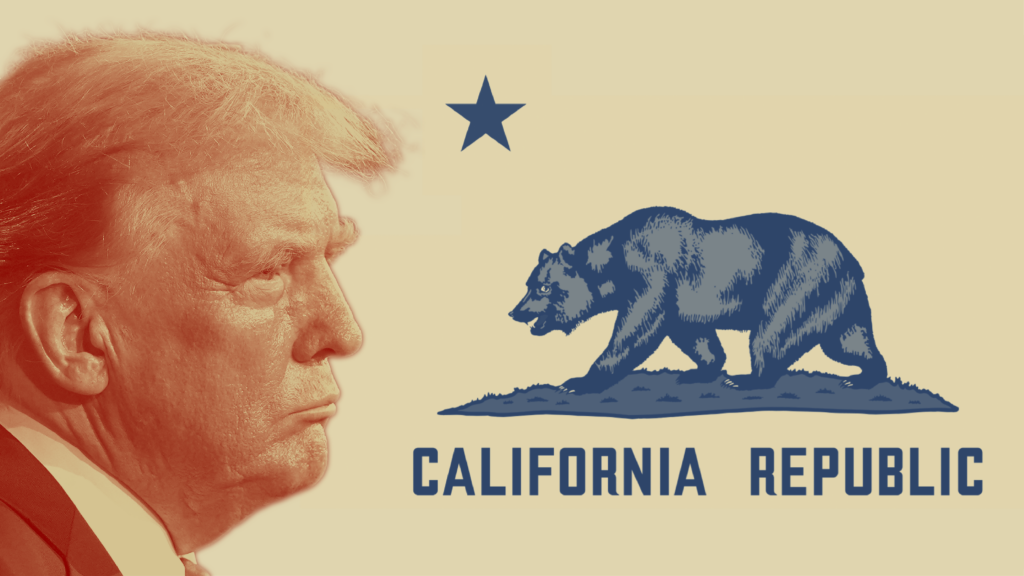The country's two biggest states are locked in a political contest that reflects the uncompromising polarization of our time: Texas and other Republican strongholds are redrawing congressional district maps to win more seats in the 2026 election, and California is now considering a similar move, hoping to offset Texas by sending more Democrats to Washington, D.C.

It's an arcane fight, using the peculiar processes of gerrymandering to press for maximum political power. But the stakes are incredibly high, says UC Berkeley political scientist Eric Schickler. While a ballot measure to redraw California's maps - Proposition 50 - is polling fairly well ahead of the Nov. 4 election, he said, the conflict has broad implications for democracy.
"Republicans are making it clear," Schickler said in an interview. "They're going to push every advantage they have now in order to hold onto the House of Representatives. And Democrats basically have a limited set of options to counter them."
Schickler is the co-director of UC Berkeley's nonpartisan Institute of Governmental Studies (IGS), and, with Berkeley political scientist Paul Pierson, he is the co-author of Partisan Nation: The Dangerous New Logic of American Politics in a Nationalized Era (2024, University of Chicago Press). Schickler will join other scholars and political analysts on an IGS panel on Tuesday, Sept. 16 at 4 p.m. to explore the perils confronting democracy in California.
Political scientists say GOP moves in Texas and other states fit the rubric of "stacking the deck" - using gerrymandering, vote suppression, misinformation and similar tactics to weaken opponents and improve their own chances of winning elections. Such efforts are often legal, and they have at times been practiced by both parties.
But, Schickler explained, today they fuel the escalation of an unpredictable, and destabilizing, political dynamic.
Berkeley News: In redrawing its congressional districts to give Republicans big advantages in the 2026 mid-term election, isn't Texas essentially stacking the deck?
Eric Schickler: With stacking the deck, the basic idea is you're trying to insulate your party from bad election results, make it more likely that you'll win the election, even if you're possibly winning fewer votes overall. And so certainly gerrymandering is a standard practice to try to stack the deck.

Morry Gash, AP
Efforts to stack the deck are as old as political parties. In recent years, as the competition between the parties has gotten tighter and as they've also moved further apart on policy, the incentive to try to push the envelope as far as you can has gotten stronger.
Republicans have had more opportunities to do that than Democrats. One reason is just that Republicans control more state legislatures than Democrats, and so that helps. They've also been somewhat more unified within the party on pushing the envelope, and the courts have been, on balance, quite supportive of them and their efforts. Those advantages have helped the party.
Historically, has there ever been a fight like this - a fierce national political conflict carried out through gerrymandering?
I think this extreme has not happened before. It's true that in the late 19th century, when there was close party balance, there was a fair bit of aggressiveness about redistricting. But it was much more a matter of each state having its own unique politics rather than the national leaders basically carrying out this fight through the states.
Regarding California, and Gov. Newsom's effort to temporarily sideline the state's model independent redistricting commission and to seek its own gerrymandered districts to favor Democrats - isn't this essentially the same thing Texas is doing in terms of stacking the deck?
I think what Newsom would argue is that this is conditional on Texas doing their redistricting, that the only reason California is doing this is to counter the impact of what Texas is doing.
Donald Trump didn't just say, "I want to do Texas." He was like, "We should do Texas, we should do Florida, we should do Missouri."
More concretely, what Newsom and the Democrats would argue is that if California does nothing, it's likely that between Texas and other states that Republicans control, they will gain about 11 to 12 seats in the House of Representatives. That would make it almost impossible for Democrats to win the majority, even if they win the overall popular vote in the House by a decent margin. They'd have to win it by three or four points nationally as opposed to just one or two points to get a majority of seats in the House.
Whereas, if California passes this redistricting, there will still very likely be more states that do redistricting to favor Republicans than Democrats. In other words, there'll be 12 seats for Republicans and six for Democrats, so a net gain of six. California alone wouldn't equal what Republicans are doing, but it partially offsets it.
In the same way that red states would band together on this, could other blue states join California and follow a similar path to neutralize the Republican gerrymandering initiatives?
There certainly is talk about it in Illinois, there's talk about it in Maryland, talk about it in New York. There are pretty big obstacles in each of those cases, though.
While it's possible the Democrats might get one or two seats out of those states, the best guess is they don't get any. They certainly are not going to get anything close to six.
You've talked about California's rationale - from the point of view of those who back Prop. 50, what would be a positive outcome? Does the measure have any downsides for Gov. Newsom or for Democrats in California?
I don't know if I'd say downsides for Democrats. But I think the state's voters have to weigh this national partisan question against the fact that they've liked how the independent, nonpartisan commission process has worked in the state for drawing new congressional districts.

Photo by Edward Lempinen
That's been successful in a lot of ways. It's made for more competition than we had before. It allowed there to be more turnover in the Legislature, more turnover in Congress.
One thing they'll weigh is that, on the one hand, this is a temporary change to that system for elections in 2026, 2028 and 2030. But it'll change California congressional elections and make some less competitive than they otherwise might have been.
Is there a risk that this move and countermove, Texas versus California, could devolve into a national melee over gerrymandering?
This is the hard part for Democrats. First of all, we see already that there are other Republican states that are going to do this, most likely, regardless of what California does. Donald Trump didn't just say, "I want to do Texas." He was like, "We should do Texas, we should do Florida, we should do Missouri."
This Supreme Court basically has said that partisan gerrymandering will not be overturned.
In all of those places, except for Indiana, where there's been some hesitation, they're starting to do it already. Ohio, also.
For Democrats, the tricky thing is they don't have that many opportunities because there are fewer states with unified Democratic control. Those that have it often have restrictions on redistricting, like the commission we have in California. New York has a kind of complicated process that makes it very hard for them to do something this year.
Republicans are making it clear: They're going to push every advantage they have now in order to hold onto the House of Representatives. And Democrats basically have a limited set of options to counter them.
IGS has done some polling on Prop. 50. How do you think California voters view this fight based on the polling so far? California is so blue - would the measure be considered a slam dunk at this point?
I wouldn't use the term "slam dunk" based on our poll. I do think it starts out in a favorable position. Our poll showed about 48% of registered voters support it, 32% oppose it, and then 20% undecided.
If one wanted to be a pessimist for Prop. 50, you would look at ballot-proposition campaigns and see that most undecideds tend to vote no in the end - either they don't vote, or they vote no. And our poll was before all the negative ads come in. So it becomes harder to grow your support. That's why it's not a slam dunk.

Donald Trump photo by Gerald Herbert / AP. Illustration by Neil Freese
The reason that I think it's in a favorable position is, first, 48% is pretty close to 50%.
Secondly, if you look at who's undecided, it tends to be more Democratic-leaning groups. Republicans are already opposed to this in big numbers. Democrats have a lot of undecideds among Latinos, a lot among Asian Americans, groups that tend to vote Democratic.
It's likely that a fair number of those undecideds will end up voting yes, after they hear the messaging from the Democratic Party. They're likely to be receptive.
The last thing that gives one reason to think it has a pretty good chance to pass is, if you look at the most regular voters - people who vote all the time - about 55% support it.
Are there political risks here for Gov. Newsom and the Democratic Party?
The biggest risk for Newsom is if Prop. 50 fails - that would certainly undermine his national reputation. On the other hand, if it does pass, I think it gives him a political boost. It's really as simple as that. If he can't sell California voters, that's going to make it harder to persuade people he's going to sell a national electorate.
Should we expect the federal courts and particularly the U.S. Supreme Court to step in and put a stop to this escalation by saying, in essence, that this sort of gerrymandering is illegal?
This Supreme Court basically has said that partisan gerrymandering will not be overturned.
Democrats will certainly challenge the Texas redistricting on the grounds of racial gerrymandering, diluting the voting power of racial minorities. But this court has greatly reduced the scope for racial gerrymandering claims. Five, 10 years ago, that argument could have succeeded. Today's Supreme Court? I'd say it's not likely to happen, but it's possible.
This court has certainly made a lot of decisions favorable to Republicans and conservatives. I don't see how they could uphold the Texas redistricting and not uphold what California does.
Any closing thoughts?
What we're seeing now is that redistricting is just being absorbed into national party competition. Once that happens, the incentives to push it harder and harder to maximize advantage for your national party just become overwhelming.
The big asymmetry now is that a lot more Democratic states use nonpartisan commissions than Republican states. So Democratic states may have to make a decision:
Do we want to continue using these nonpartisan commissions? Even if we like it for our own state, does it weaken our party nationally? That's a question that people are going to start asking and this is maybe a first instance of that.






